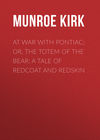Kitabı oku: «Under the Great Bear», sayfa 5
CHAPTER IX.
SENDING IN A FALSE REPORT
At sight of Cabot, Thorpe Walling's instinct had been to leave the car and follow him; but the thought of his luggage, which he knew he could not get off in time, caused him to hesitate, and then it was too late, for the train was again in motion.
"The young man did not seem particularly anxious to meet his old classmate," remarked Mr. Gregg. "In fact, it rather looked as though he wished to avoid recognition."
Thorpe pretended to be too busy with his cards to make reply to this suggestion; but an ugly expression came into his face, and, from that moment, he hated Cabot Grant. When, on the following day, he reached St. Johns and learned of the loss of the "Lavinia," with all on board, except those saved in the mate's boat, he was more perplexed than ever. Cabot's name was published as one of those who had gone down with the ill-fated steamer, and yet he had certainly seen him alive and well only the day before. What could it mean?
"Do you suppose Hepburn knows of his escape?" asked Mr. Gregg, who was stopping at the same hotel, and to whom Thorpe confided this mystery.
"I haven't an idea."
"What do you say to wiring and finding out? It can't do us any harm, and might gain us an insight into the old man's plans up here."
"I should say it was a good idea."
As a result of this desire for information the following telegram was sent to the president of the Gotham Trust and Investment Company:
"St. Johns, N'f'l'd.—Here all right. What shall I do next?–C. G."
And the answer came promptly:
"Congratulations. Send B. I. report. If in need of funds, draw.–H."
"That settles it!" exclaimed Mr. Gregg, exultingly. "Hepburn is after Bell Island, and your friend was sent here to report upon its value. Now, it will be a pity if the old man doesn't get his information, which he isn't likely to do for some time with that young chap over on the west coast. Some one ought to send him a report."
"I have a mind to do it myself," said Thorpe, reflectively.
"It would be an awfully decent thing for you to do. Be a good joke on your friend, too, and make him fed ashamed of himself for cutting you so dead yesterday, when he finds it out. He is bound to get into trouble if some sort of a report isn't sent in, now that he is known to have escaped from the wreck."
"Confound him!" exclaimed Thorpe. "I don't care how soon he gets into trouble; nor how much."
"Oh, come. That isn't a nice way to speak of an old friend and classmate," remarked Mr. Gregg, reprovingly. "Now, I always feel sorry when I see a decent young chap like that throwing away a good chance, and want to help him if I can. So in the present case, I think we really ought to send in a report that will satisfy old Hepburn, and keep the boy solid with his employers. I shouldn't know how to word it myself, but if you, with your expert knowledge of the subject, will make it out, of course after taking a look at the mine, I'll see that you don't lose anything by your kindness."
"All right," replied Thorpe, who was quite sharp enough to comprehend the other's meaning. "I'll do it."
So the two conspirators drove to the picturesque fishing village of Portugal Cove, where they hired a boat to carry them across to Bell Island. There they paid a hasty visit to the mine, which Mr. Gregg plausibly belittled and undervalued, until Thorpe really began to consider it a greatly overestimated piece of property, and this idea he embodied in a report that he wrote out that very evening.
"I'm glad to see that you think as I do concerning the real worthlessness of Bell Island," remarked Mr. Gregg, gravely, as he glanced over the paper, "and the man who would have anything to do with it after reading this must be a greater fool than I take old Hepburn to be."
On the following day a type-written copy of Thorpe's report was made, signed "C. G.," and forwarded by mail to the president of the Gotham Trust and Investment Company. As a result, a telegram was received a week later at the Bank of Nova Scotia in St. Johns addressed to Cabot Grant, and desiring him to return at once to New York. As the bank people wired back that they had no knowledge of any such person, Mr. Hepburn in reply requested them to keep a sharp lookout for a young man of that name, who would shortly present a letter of credit to them, and provide him with a ticket to New York on account of it, but nothing more. Mr. Hepburn also explained that, as Cabot Grant's guardian, he had the right to thus limit his ward's expenditures.
Thus our lad fell into disgrace with his employer, who knew, as well as any man living, the exact status of the Bell Island iron mine, and had only requested Cabot to report on it in order to test his fitness for other work.
While the correspondence with the bank was being carried on, Messrs. Walling and Gregg watched for the arrival of the young engineer, whom they expected by every train. They also anxiously awaited the news that the Hepburn syndicate had withdrawn its offer for the Bell Island property, in which event it would fall, at a greatly reduced price, to the company represented by Mr. Gregg.
Totally unconscious of all this, Cabot Grant was at that very time in a remote corner of the west coast, happily engaged in aiding certain of its inhabitants to discomfit the combined naval forces of two of the most powerful governments of the world. Moreover, he had become so interested in this exciting occupation, as well as in certain discoveries that he was making, as to have very nearly lost sight of his intention to visit the capital of the island.
When he reëmbarked on the "Sea Bee" at St. George's Bay, he fully intended to catch the train of two days later at the station to which White had promised to convey him. He was glad of a chance to view some more of that magnificent west coast scenery, and when the little schooner finally rounded South Head, and was pointed towards the massive front of Blomidon, which David Gidge called "Blow-me-down," he felt well repaid for his delay by the enchanting beauty of the Bay of Islands that lay outspread before them.
Soon after passing South Head, the "Sea Bee," with flags flying from both masts, slipped through a narrow passage into the land-locked basin of Pretty Harbour. On its further shore stood a handful of white houses, and a larger building that fronted the water.
"That's our factory!" cried White, "and there is our house, on the hillside, just beyond. See, the one with the dormer windows. There's Cola waving from one of them now. Bless her! She must have been watching, to sight us so quickly. Oh, I can't wait. Dave, you take the 'Bee' up to the wharf. Mr. Grant will help you, I know, as well as excuse me if I go ashore first."
"Of course, I will," replied Cabot; and in another minute the young skipper was sculling ashore in the dinghy, while the schooner drifted more slowly in the same direction.
When they finally reached the factory wharf White was on hand to meet them, and beside him stood the slender, merry-eyed girl for whom the schooner had been named. She unaffectedly held out a hand to Cabot when they were introduced, and at once invited him to the house to meet her mother.
"Yes," said White, "you two go along, and don't wait for me. You see," he added, apologetically, to Cabot, "there's been a great catch of lobsters, and if I can only get them packed before we are interfered with, we'll make a pretty good season of it, after all."
So the new-comer walked with Cola up the straggling village street, past a score of fisher cottages, each with a tiny porch, pots of flowers in the front windows, and a bit of a garden fenced with wattles, to keep out the children, goats, dogs, and pigs, that swarmed on all sides. At length they came to the neatly kept and comfortable-looking house, overlooking the whole, that White Baldwin called home. Here Cabot was presented to the sweet-faced invalid mother, who sat beside a window of the living-room, from which she could look out on the little harbour, and who was eager to learn the details of his recent experiences that White had only found time to outline to her.
Both mother and daughter listened with deepest interest while Cabot told of the loss of the "Lavinia," and when he had finished Mrs. Baldwin said:
"You certainly made a wonderful escape, and I am grateful that my boy was granted the privilege of rescuing you from that dreadful raft. I am confident, also, that you have been brought to this place for some wise purpose, and trust that you are planning to remain with us as long as your engagements will permit."
"Thank you, madam," replied Cabot. "I wish I might accept your hospitality for a week, at least. For I am certain I should find much to enjoy in this delightful region. I feel, however, that I ought to catch to-morrow's train, as it is rather necessary for me to reach St. Johns without further delay."
"It seems queer," remarked Cola, "that this stupid place can strike even a stranger as being delightful, since there is no one to see but fisherfolk, who can talk of nothing but fish, and there isn't a thing to do but watch the boats go and come. For my part, I am so tired of it all that I wish something would happen to send us away from here forever."
"My dear!" said Mrs. Baldwin to Cola, reprovingly.
"Some one seems to have found an occupation here in collecting a cabinet of specimens," suggested Cabot, indicating, as he spoke, some shelves covered with bits of rock, that had attracted his attention.
"Yes," admitted Cola, "I have found some amusement in gathering those things; but I don't know what half of them are, and there is no one here to tell me."
"Possibly I might help you to name some of them," said Cabot, "as I have a bowing acquaintance with geology."
"Oh! can you?" cried the girl. "Then I wish you would, right away, for I am almost certain that several of them contain minerals, and I want awfully to know if they are gold."
The next moment the two young people were standing before the cabinet, deep in the mysteries of periods, ages, formations, series, and other profound geologic terms. All at once Cabot paused, and, holding a bit of serpentine in his hand, asked:
"Did this come from about here?"
"Yes; ail of them did."
"Could you show me the place, or somewhere near where you found it?"
"I think I could, if we had time; but not if you are going away in the morning, for it would take at least half a day."
"Well," said Cabot, "I believe I might wait over long enough for that, and guess I won't start for St. Johns to-morrow, after all."
CHAPTER X.
CABOT ACQUIRES A LOBSTER FACTORY
The Baldwins were greatly pleased at Cabot's decision to wait over a train; for, as Mrs. Baldwin said, a desirable guest in that out-of-the-way corner of the world was the greatest of luxuries. White was glad to prolong the friendship so strangely begun, and also to escape a present necessity for leaving his work to carry Cabot to the distant railway station, while Cola was delighted to have found what she termed a geologic companion. After it was arranged that these two should set forth early the following day on a search for specimens, Cabot strolled down to the factory to learn something of the process of canning lobsters.
He was amazed at the change effected in so short a time. When he landed at Pretty Harbour the factory had been closed, silent, and deserted. Now it was a hive of bustling activity, in which every available person of the village, including women and children, was hard at work. Fires were blazing under a number of great kettles half filled with boiling water. Into these, green lobsters were tossed by barrowfuls, to be taken out a little later smoking hot and coloured a vivid scarlet. On the packing tables their shells were broken, and the extracted meat was put into cans, to which covers, each with a tiny hole in the middle, were soldered. Then the filled cans were steamed, by trayfuls, to exhaust their air; a drop of solder closed each vent, and they were ready for labelling and packing in cases. White Baldwin, in person, superintended all these operations, while David Gidge saw to the unloading of the "Sea Bee," and kept sharp watch on a gang of shouting urchins, who were withdrawing the live lobsters from the outside salt-water pens, in which they had been kept while awaiting their fate.
White was in high spirits, for the travelling agent of a St. Johns business house had just offered a good cash price for his entire pack.
"Of course," the young proprietor said to Cabot, as they viewed the busy scone, "we won't make anything like what we would if we were allowed a whole uninterrupted season; but, if they will only let us alone for a week, I'll pack a thousand cases. Those will yield enough to support us for a year, and before that is up I'm not afraid but that I'll find some other way of earning a living. Now, if I can only get sufficient help, I'm going to run this factory night and day for the next week, unless compelled by force to stop sooner."
Cabot was already so interested that he promptly volunteered to aid in making the all-important pack.
"I don't know anything about the business," he said, "but if you can make use of me in any way, I shall be only too glad of a chance to repay a small portion of the great debt I owe you."
"Nonsense!" laughed White. "You don't owe me a thing, and I don't want you to feel that way. At the same time I should be ever so glad of your help in getting things well started; for just now one strong fellow like you would be worth a dozen of those children."
So, a few minutes later, Cabot, clad in overalls and an old flannel shirt of White's, was as hard at work as though the canning of lobsters was the business of his life. Far into the night he laboured, only pausing long enough to go up to the house for supper; and, on the following morning, he was actually pleased that a heavy rain storm should postpone the trip for specimens, furnish him with an excuse for prolonging his stay, and leave him at liberty to resume his self-imposed task in the factory.
The storm lasted for two days, at the end of which time half the pack had been made, and Cabot had become so familiar with all details of the work as to be a most valuable assistant. On the third day, the supply of lobsters on hand being exhausted, operations were suspended until the boats could return with a new catch; and, as the weather was again fine, Cabot and Cola set forth on their geological exploration.
It was a glorious day, with a sky of deepest blue; the hot sunshine tempered by a cool breeze pouring in from the sea, and all nature sparkling with joyous life. To Cabot, who had thought of Newfoundland as a place of perpetual fog, and almost constant rain, the whole scene was a source of boundless delight. As the two young people climbed the steep ascent behind the village, new beauties were unfolded with each moment, until, when they reached the crest, and could look far out over the islanded bay, with the placid cove and its white hamlet nestling at their feet, Cabot declared his belief that there was not a more exquisite view in all the world.
After gazing their fill, the explorers plunged into a sweet-scented forest of spruce and birches, threaded by narrow wood roads, and tramped for miles, stopping now and then to examine some outcropping ledge or gather a handful of snow-white capilear berries. But the main object of their quest, the copper-bearing serpentine, was not found until they had gained the summit of the Blomidon range and were in full view of the sea. Then they came to a distinct outcrop of mineral-bearing rock that caused the eyes of the young geologist to glisten with anticipation.
While he chipped off specimens, studied the trend of the ledge, and made such estimates of its character as were possible from surface indications, his companion climbed a rocky eminence that, short of Blomidon itself, commanded the most extended view of any in that region. She had hardly gained the summit when she uttered a cry that attracted Cabot's attention and caused him to hasten in her direction. In a few moments he met her running breathlessly down the hill.
"What is it?" he asked. "Are you hurt?"
"A warship coming up the coast," she panted. "I saw it plainly, and we must get back with the news as quick as we can."
Much as Cabot hated to give over the exploration of that wonderful copper-bearing ledge, he did not hesitate to obey the imperative call of friendship, and accompanied Cola with all speed back to the village. When they reached it they found White jubilant over the extraordinary catch of lobsters that was even then being brought in.
"Hurrah!" he cried, as Cabot appeared. "Biggest catch of the season, and you are just in time to help pack it away. But what brings you back so early? I thought you were off for all day."
"Oh, White, they are coming!" gasped Cola.
"Who are coming?"
"A warship. I saw it from Maintop."
"British or French?"
"I don't know. I only knew it was a warship because it was so much bigger than the 'Harlaw' and had tall masts."
"Well, it don't make any difference," growled White, "one is just as bad as another, and our business is ruined anyway. Why couldn't they have kept away for three days longer?"
"What will they do?" inquired Cabot, curiously.
"I don't know," replied White, bitterly. "Either destroy or seize the whole plant and leave us to starve at our leisure. Now, I suppose we might as well go up to the house and tell mother. There's no use doing any more work under the circumstances."
"I don't see why not," objected Cabot, who was not accustomed to throwing up a fight before it was begun. "There is a possibility that the vessel may not be a warship after all, and another that she is not coming to this place. Even if she does, you don't know that she has any warrant for interfering with your business. So, if I were you, I'd go right on with the work and keep at it until some one compelled me to stop. I say, though, speaking of warrants gives me an idea. All you want is three days' delay, isn't it?"
"That is what I want most just now," replied White.
"Well, then, why not place this property in the name of some friend—David Gidge, for instance—and when those men-of-war people begin to make trouble let him ask them whose factory it is they are after. They will say yours, or your mother's, of course. Then he'll speak up and say in that case they've come to the wrong place, since this is the property of Mr. David Gidge, while their warrant only mentions that of Mrs. Whiteway Baldwin. It'll be a big bluff, of course, and won't work for very long, but it may puzzle 'em a bit and give the delay of proceedings that you require."
"I believe you are right about keeping on with the work," replied White, thoughtfully; "though I am not so sure about the other part of your scheme. Anyway, I must run to the house for a little talk with mother, and if you'll just set things going in the factory I shall be much obliged."
"All right," agreed Cabot, "I'll shake 'em up."
And he was as good as his word, for when, after an absence of more than an hour, White reappeared on the scene he found the factory in full blast, with its operatives working as they had never worked before, and Cabot Grant, the most disreputable-looking of the lot, urging them on by voice and example to still greater exertions. He seemed to be everywhere and doing everything at once.
"Hello, old man! We've got greenbacks to burn, and we're a-burning 'em," he cried cheerily as he paused to greet his friend, and at the same time dash the streaming perspiration from his face with a grimy hand. "What's the news?"
"The news is that you are a trump!" exclaimed White, "and that in spite of all you are doing for us we want you to grant us still another favour."
"Name it, my boy, and if it is anything within reason, including a defiance of the whole British navy, I'll do it," laughed Cabot.
"I hope you will, for it is something that we all want you to do very much," responded White. "You see it's this way. I spoke of your suggestion to mother, and she thought so well of it that I went to the magistrate and got him to draw up a deed transferring this property, for a nominal consideration, to a friend. Now it is all ready for signatures, and we want you to be that friend."
"Me!" cried Cabot, completely staggered by this unexpected result of his own planning. "You can't mean that. Why, you don't know anything about me. For all you know I might never give the property back to you."
"We are willing to risk that," replied White, "and would rather trust you to act for us in this matter than any one else we know. It is a big favour to ask, I know; but you said you felt indebted to me and only wanted a chance to pay off the debt, so I thought perhaps—but if you don't want to do it, of course–"
"But I will, if you really want me to," cried Cabot. "I have always longed to own a lobster factory. It never entered my head when I proposed the plan that I would help carry it out; but if you think I can be of the slightest assistance in that way, why of course I am only too glad."
So the papers constituting Cabot Grant, Esq., sole owner of the Pretty Harbour lobster factory were duly signed and recorded; and at sunset of that very evening our hero stood regarding his suddenly acquired property with the air of one who is dubiously pleased at a prospect.



















